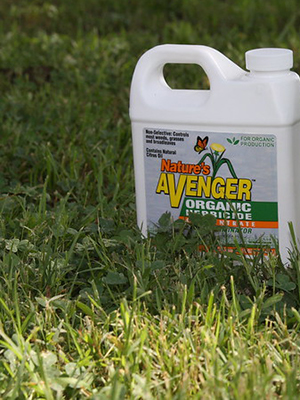Herbicides

Organic herbicide. Photo: April Sorrow, UGA CAES/Extension
Weeds can be a gardener's worst nightmare. Herbicides are chemicals that are applied to weeds to prevent or kill them. They can be effective if instructions are properly followed and the correct herbicide is used. Timing of herbicide applications is the key to successful herbicide use. There are many different types; do your research and choose the proper herbicide for your specific weeds.
Horticultural Soaps as Herbicides
Many gardeners know that horticultural soaps can be used to manage insects in the garden, but not everyone knows that they can also act as herbicides. Horticultural soaps are made from specific salts that are found in fatty acids, a natural component found in plants and animals. In the right concentrations, these salts can be harmful to plants. Certain organic weed control products use these salts to act as a nonselective herbicide that can kill many weeds, grasses, mosses, and algae. Before using these products, be sure to read and follow label instructions and safety guidelines.
Pre-emergence Herbicides
Pre-emergence herbicides are applied before weeds are a problem and keep weed seeds from growing and emerging from the soil. They're commonly used in the lawn, but can also be applied to landscape beds. A two- to three-inch layer of mulch will also help keep weed problems down in your beds.
Pre-emergence herbicides can be applied in either liquid or granular form, and are often specific to particular kinds of weeds. Always read and follow directions for how and where to apply any pesticide.
Nonselective Herbicides
Nonselective herbicides contain active ingredients like glyphosate or glufosinate that will kill any plants they come in contact with. They can be used to spot-treat weeds in lawns or beds, and can be helpful when you're renovating a lawn or creating a new landscape bed.
Glyphosate and glufosinate won't persist in the soil, but some nonselective herbicides will, meaning that they'll continue to inhibit plant growth long after you spray. Don't use these persistent forms in areas where you want to put new plants.
Always be sure to read the product label and follow all recommendations for application, disposal, and storage.
Selective Herbicides
Selective herbicides are a targeted approach to weed control. This means that unlike a general herbicide that could harm desired plants, they work on a specific type of plant.

